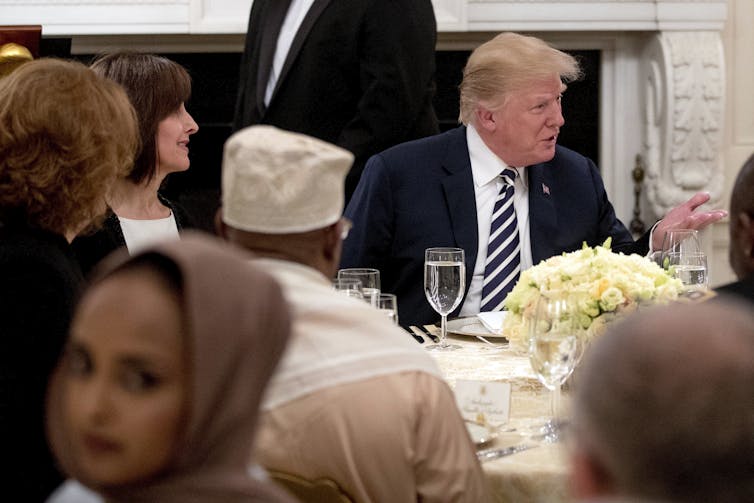Kalpana Jain, The Conversation
During the month of Ramadan, Muslims around the world will not eat or drink from dawn to sunset. Muslims believe that the sacred text of Quran was first revealed to Prophet Muhammad in the final 10 nights of Ramadan.
Here are four ways to understand what Ramadan means for Muslims, and in particular for American Muslims.
1. Importance of Ramadan
Ramadan is one of the five pillars of Islam. Each pillar denotes an obligation of living a good Muslim life. The others include reciting the Muslim profession of faith, daily prayer, giving alms to the poor and making a pilgrimage to Mecca.
Mohammad Hassan Khalil, associate professor of religious studies and director of the Muslim Studies Program at Michigan State University, explains that the Quran states that fasting was prescribed for Muslims so that they could be conscious of God. He writes,
“By abstaining from things that people tend to take for granted (such as water), it is believed, one may be moved to reflect on the purpose of life and grow closer to the creator and sustainer of all existence.”
He also notes that for many Muslims, fasting is a spiritual act that allows them to understand the condition of the poor and thus develop more empathy.
2. Halal food
During Ramadan, when breaking fast, Muslims will eat only foods that are permissible under Islamic law. The Arabic word for such foods, writes religion scholar Myriam Renaud, is “halal.”
Renaud explains that Islamic law draws on three religious sources to determine which foods are halal. These include “passages in the Quran, the sayings and customs of the Prophet Muhammad, which were written down by his followers and are called ‘Hadith’ and rulings by recognized religious scholars.”
In the United States, some states such as California, Illinois, Michigan, Minnesota, New Jersey and Texas restrict the use of halal label for foods that meet Islamic religious requirements. Various Muslim organizations also oversee the production and certification of halal products, she writes.
3. Puerto Rican Muslims
In Puerto Rico, where many have been reverting to the religion of their ancestors – Islam – Ramadan could mean combining their identity as a Puerto Rican and as a Muslim.
Ken Chitwood, a Ph.D. candidate at the University of Florida, explains that Muslims first came to Puerto Rico as part of the transatlantic colonial exchange between Spain, Portugal and the New World. There is evidence, he writes, of the first Muslims arriving somewhere around the 16th century.
In his research, he found Puerto Rican Muslims in search of a “Boricua Islamidad” – “a unique Puerto Rican Muslim identity that resists complete assimilation to Arab cultural norms even as it reimagines and expands what it means to be Puerto Rican and a Muslim.”
He saw the expression of this identity in the food as Puerto Rican Muslims broke fast – “a light Puerto Rican meal of tostones – twice-fried plantains.”
4. Jefferson’s Quran

With an estimated 3.3 million American Muslims, Ramadan is celebrated each year at the White House, except for one year in 2017. Scholar Denise A. Spellberg explains that the tradition was started by Hillary Clinton when she was the first lady.
She writes that “Islam’s presence in North America dates to the founding of the nation, and even earlier.” Among the most notable of the key American Founding Fathers who demonstrated an interest in the Muslim faith was Thomas Jefferson. Her research shows that Jefferson bought a copy of the Quran as a 22-year-old law student in Williamsburg, Virginia, 11 years before drafting the Declaration of Independence. And as she says,
“The purchase is symbolic of a longer historical connection between American and Islamic worlds, and a more inclusive view of the nation’s early, robust view of religious pluralism.”
This article is a roundup of stories from The Conversation’s archive.
Kalpana Jain, Senior Religion + Ethics Editor, The Conversation
This article is republished from The Conversation under a Creative Commons license. Read the original article.









